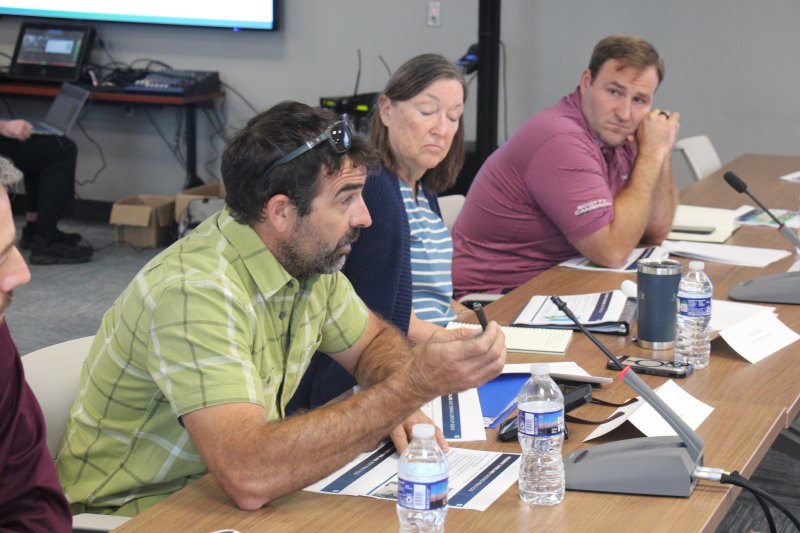Farmer lobbies for agriculture on land-use reform panel

Baxters have farmed fields around Georgetown since 1903.
It started with James Baxter Sr., after he returned from Baltimore, where he went to open a tomato cannery. Today, James Baxter IV, who goes by Jay, raises chickens and grows corn, soybeans, lima beans and sweet corn. He and his wife, Jessica, have diversified to other agriculture businesses, including Salted Roots, which leases palm trees to customers during warm months.
The couple have four children, sons ages 17, 14 and 10, and a 6-year-old daughter. Jay Baxter’s two sisters, including Kristy Malin, who works the farm with him, have six children total.
A fourth-generation farmer, Jay Baxter has seen Sussex County change significantly in recent years as residential and commercial developments flourished and spread west from beach communities into agricultural and forested areas.
His oldest child has expressed strong desire to go into the family business, while the interest of the others varies.
“The fifth generation is right there,” Baxter said. “Out of 10 kids, one of them may want to farm. That’s why we want to preserve our way of life. But yet we want to preserve our assets too. And that’s where we get caught talking out of both sides of our mouths.”
Baxter represents the Sussex County Farm Bureau on a 10-member land-use reform working group created by Sussex County Council to recommend limits on development in the fastest-growing county in the state.
In recent years, the pace at which farmland and open space have been converted to housing tracts has escalated, burdening roads, schools, emergency services, healthcare providers and the environment.
Farmers are at a tipping point. They struggle with the high cost of equipment and other expenses, encroachment by development, the physical demands of the business they love and, in many cases, difficulty finding someone to take over the farm. Then there is the temptation to cash in on the land, their biggest asset.
During the working group’s June 12 meeting, focusing on farmland and open space, members turned to Baxter for his knowledge of farming. He urged the group to create rules that protect farms and the interests of farming families.
“I need to keep painting this picture, the broad picture, of what the future may look like in order for me to help you all to understand why our recommendations are going to be what they are,” he said. “I want to make sure that we preserve the farmer.”
Baxter arrived late to the meeting after working to resolve equipment breakdowns the previous night that continued into the morning.
“Honestly, I represent every farmer in Sussex County that will have me,” he said afterward. He also represents a large group of people who own open land.
Baxter likened the responsibility of the working group to his own farm operation.
“Every decision that we make – just like at the farm, every decision that I make at Baxter Farms – it affects the next generation or multiple generations to come,” he said.
One option to preserve farmland and open space, which is being used in Kent and New Castle counties, is transfer of development rights. This establishes growth areas in the county. In exchange for concessions that allow for denser building within the growth area, developers purchase the development rights of land outside growth zones to help fund preservation of farmland and open space.
Baxter said he was reluctant to make such an arrangement on a permanent basis, as it would limit his family’s options. They want to preserve their way of life but have the option to sell land, if they choose.
“The future is never guaranteed for us,” Baxter said. “We’ve learned that as a family. We never want to tie the hands of the next generation. If we sell our development rights and say that land can only be farmed, that’s all that can be done into perpetuity, then we’re forcing generations to come that they must farm.”
Baxter suggested a short-term sale of rights, perhaps for 10 years. Others in the group recommended a longer period of at least 20 or 30 years.
To keep farming viable in Sussex County, the working group will have to keep the needs of farmers in mind in drafting recommendations on growth for county council, he said.
“You make what we do worthwhile, we’ll want to keep the land in farmland because we want to continue to do what we do,” Baxter said. “That’s my ultimate point of what I’m getting at now.”
Kevin Conlon came to the Cape Gazette with nearly 40 years of newspaper experience since graduating from St. Bonaventure University in New York with a bachelor's degree in mass communication. He reports on Sussex County government and other assignments as needed.
His career spans working as a reporter and editor at daily newspapers in upstate New York, including The Daily Gazette in Schenectady. He comes to the Cape Gazette from the Cortland Standard, where he was an editor for more than 25 years, and in recent years also contributed as a columnist and opinion page writer. He and his staff won regional and state writing awards.
Conlon was relocating to Lewes when he came across an advertisement for a reporter job at the Cape Gazette, and the decision to pursue it paid off. His new position gives him an opportunity to stay in a career that he loves, covering local news for an independently owned newspaper.
Conlon is the father of seven children and grandfather to two young boys. In his spare time, he trains for and competes in triathlons and other races. Now settling into the Cape Region, he is searching out hilly trails and roads with wide shoulders. He is a fan of St. Bonaventure sports, especially rugby and basketball, as well as following the Mets, Steelers and Celtics.




















































